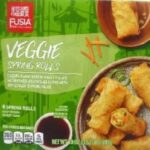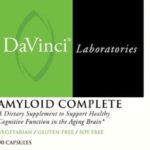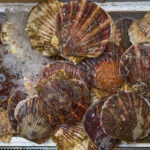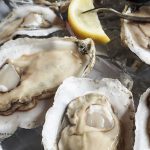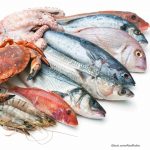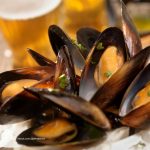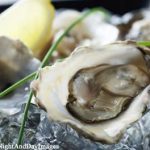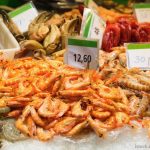Fusia Asian Inspirations Veggie Spring Roll is being recalled because it may contain shrimp (shellfish), one of the nine major food allergens, that is not declared on the product label as required. No allergic reactions have been reported to the company to date in connection with the consumption of this product. The recalling firm is Tai Foong USA of Seattle, Washington. The recalled product was distributed exclusively to ALDI stores nationwide and sold under the Fusia Asians Inspiration brand. The recalled item is Fusia Asian Inspirations Veggie Shrimp Rolls that are packaged in a green 10 ounce box with a picture of the product on the front. The UPC number that is stamped on the product label is 4099100222258. The best before date of 5/17/2027 is printed on the back panel of the … [Read more...]
Amyloid Complete Supplement Recalled For Shellfish
Amyloid Complete dietary supplement is being recalled because it may contain shellfish (shrimp and crab) that is not declared on the label as required by law. Anyone who is allergic to those ingredients could have a serious reaction if they consume this product. No illnesses or allergic reactions have been reported to the company to date in connection with the consumption of this product. The recalling firm is DaVinci Laboratories, a division of FoodScience LLC of Williston, Vermont. There are 72 bottles of this supplement included in this recall. The product, Amyloid Complete, was distributed nationwide through iHerb.com, fullscripts.com, and direct delivery. The recalled product is packaged in a white plastic bottle. The supplement is a tan capsule. The bottle has the lot … [Read more...]
Do Not Eat or Serve Intershell International Corp Live Scallops
The FDA is warning restaurants not to serve Intershell International Corp live scallops because they were harvested from prohibited waters in Massachusetts. The FDA says that the shellfish harvester was unlicensed and the scallops are incorrectly labeled with harvest location FED 514, with harvest dates of 12/26/23, 12/27/23, and 01/01/24. Restaurants and food retailers in Illinois, Massachusetts, New Jersey, New York, and Pennsylvania are included in this warning. The FDA is investigating to see if these scallops were distributed to other states as well. This warning does not include fresh or frozen non-live packaged scallop meat, which is the vast majority of scallops sold in the United States. Food retailers should dispose of the Intershell International Corp live scallops, whole … [Read more...]
How Do You Know If You Have a Vibrio Vulnificus Infection?
How do you know if you have a Vibrio vulnificus infection? This illness, which has a 33% mortality rate, can be very serious. The bacteria is carried by raw seafood, especially oysters. Vibrio vulnificus can cause food poisoning, and it can also sometimes cause necrotizing fasciitis, otherwise known as an infection of "flesh-eating bacteria." There are several Vibrio serotypes that cause human illness. Vibrio vulnificus causes the most serious, and vibrio parahaemolyticus also causes illness, although it is generally less serious. Vibrio vulnificus is the leading cause of death linked to seafood consumption in the United States. It is commonly found in the Gulf of Mexico, in higher concentrations in the summer. This pathogen lives in warm seawater, especially water that is … [Read more...]
Do You Know How To Buy and Serve Fresh Seafood?
Fresh seafood is a part of a healthy and balanced diet. But do you know how to buy and serve fresh seafood? These foods can cause food poisoning if not handled safely. The FDA has tips to help you. When buying fresh seafood there are things to look for. First of all, fish should not "smell." It should have a mild and fresh aroma and not small sour, "fishy," or like ammonia. A whole fish's eyes should be clear and shiny, and the flesh should be firm and spring back when pressed. Fish fillets should not be discolored or be drying around the edges. Shellfish such as shrimp, lobster, and scallops should be clear with a pearl-like color and no odor. Packaged fresh seafood with time/temperature indicators should only be purchased if the indicator shows the product is safe to eat. And … [Read more...]
Oxycodone Traces Found in Puget Sound Bay Mussels
Traces of oxycodone have been found in Puget Sound mussels, according to research from the Puget Sound Institute. The native bay mussels were harvested from the Seattle and Bremerton area harbors. These shellfish were part of the state's Puget Sound Mussel Monitoring Program. Scientists at the Washington Department of Fish and Wildlife transplant uncontaminated mussels from an aquaculture source on Whidbey Island to different locations in Puget Sound to help them study levels of pollution. Mussels, like other shellfish, are filters feeders, so they concentrate chemicals, bacteria, and other contaminants from the environment into their tissue. After a few months, the mussels are collected, and scientists analyze the contaminants. The areas where the tainted mussels were … [Read more...]
Parts of Maine’s Coastline Closed to Shellfish Harvesting
Parts of Maine's coastline are being closed by the State of Maine Department of Marine Resources to certain types of shellfish harvesting because tests showed the sea creatures may contain domoic acid toxin at dangerous levels. Two notices have been posted on the Maine web site: one for Area No. 64-A and the other for Area No. 64-B. In addition to this closure, clams and mussels recently harvested from those areas should not be eaten. Domoic acid is a biotoxin produced by a plankton, or naturally occurring algae, called diatoms. The toxin accumulates in shellfish flesh but does not hurt those animals. Excessive levels of this toxin can cause serious illness and even death in humans. The illness caused by this toxin is called amnesic shellfish poisoning (ASP). The notice for 64-A … [Read more...]
Washington Shellfish Recalled After Norovirus Outbreak
According to the Interstate Shellfish Sanitation Conference (ISSC), Washington state has issued a recall of shellfish after a norovirus-like outbreak occurred after an event. At least six people were sickened in this Oregon outbreak; two cases have been confirmed as Norovirus. The event had 100 attendees; about half ate oysters harvested from Hook Canal 5 and Hammersley Inlet in Mason County. Oysters are not definitively linked to the outbreak, since only 10% of the attendees of the event were interviewed, hand-washing facilities were not adequate so an ill employee could have contaminated foods, and the event was crowded so person-to-person transmission could have occurred. But, the Washington State Department of Health then received two additional cases in other areas; those … [Read more...]
Shellfish Irradiation To Reduce Food Poisoning Gets FDA Nod
The U.S. Food and Drug Administration has approved the use of ionizing radiation to kill foodborne pathogens on crustacean shellfish and extend their shelf life. The April 11 decision is in response to a food additive petition submitted by the National Fisheries Institute 13 years ago. The decision will allow processors of crustaceans including crab, shrimp, lobster, crayfish, and prawns use small amounts of ionizing radiation to reduce, but not eliminate, dangerous foodborne bacteria such as E.coli, Vibrio and Listeria. The maximum permitted dose is 6.0 kiloGray. The rule covers shellfish sold raw, frozen, shelled, dried, cooked and partially cooked. It also covers crustaceans processed with spices or a small number of other ingredients. Irradiation has been approved for use on … [Read more...]
Sport-Harvested Shellfish Warning in Monterey, Santa Cruz CA
The California Department of Public Health has issued a warning for shellfish recreationally harvested in Monterey and Santa Cruz counties because they may contain a toxin called domoic acid, which causes Amnesic Shellfish Poisoning (ASP) that can lead to severe illness or death. The warning does not apply to commercial shellfish which are subject to frequent mandatory tests for toxins. No illnesses have been reported, but dangerous levels of toxins have been detected in the waters of these regions. The illness is now called domoic acid poisoning, since the toxin has also been found in fin fish. Symptoms of poisoning from domoic acid appear between 30 minutes and 24 hours of ingestion and can last several days. They include vomiting, diarrhea, abdominal cramps, headache and … [Read more...]
